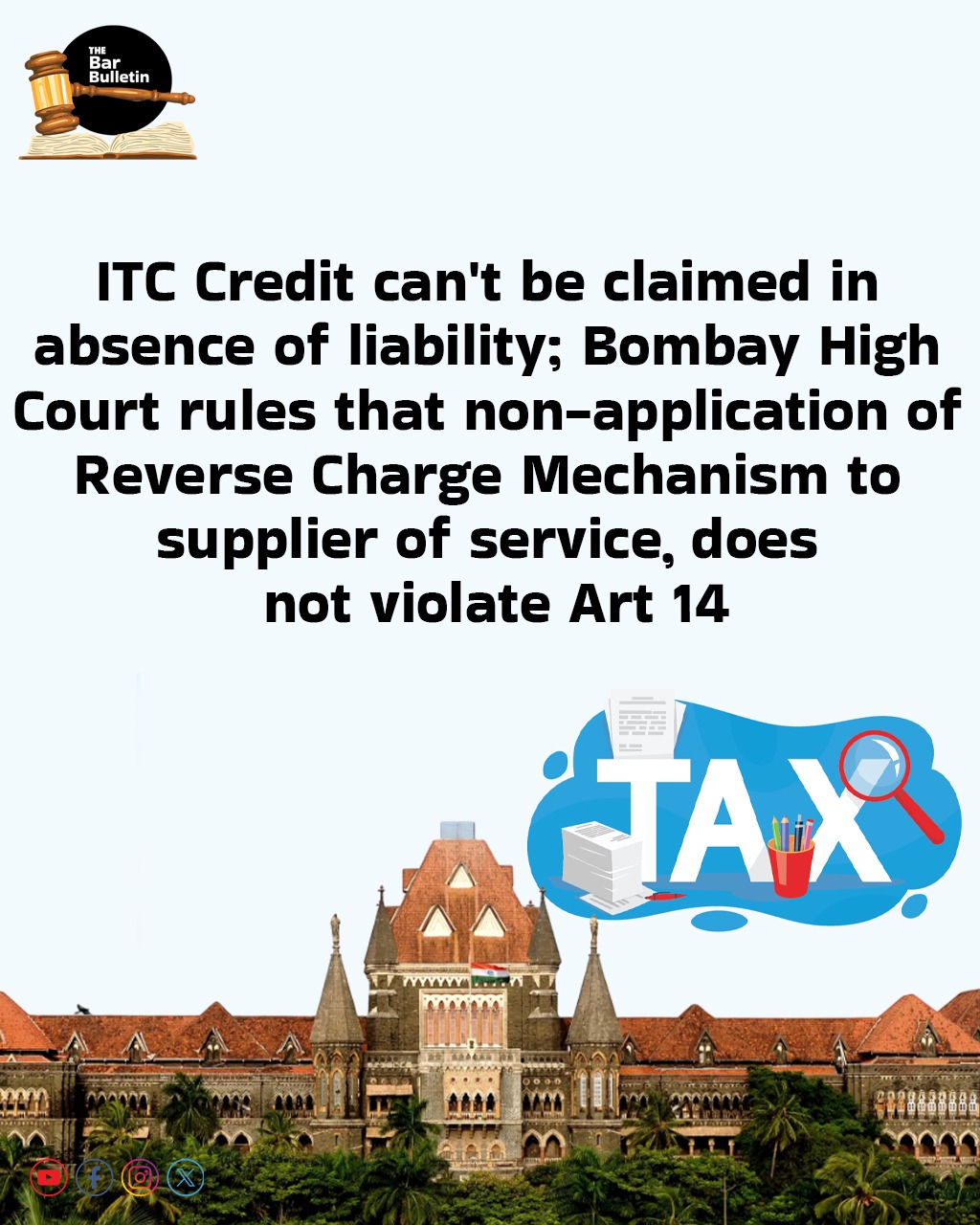The Bombay High Court recently clarified that Input Tax Credit (ITC) is in nature of benefit/ concession extended to person under statutory scheme, and even if it is held to be ‘entitlement’, it is always subject to restrictions under GST Act. The Court therefore ruled that merely because Reverse Charge Mechanism (RCM) is not made applicable to supplier of service who is body corporate, whereas it is made applicable to other person, is no ground to invoke Art 14 of Constitution to contend unequal treatment among equals.
The Division Bench comprising Justice M S Sonak and Justice Jitendra Jain observed that no provision of law can be struck down to make any business competitive for particular type of entity, and Article 19(1)(g) of Constitution guarantees freedom to carry on business or profession, but not competitiveness of business entity in market. Since in RCM there is no output tax liability because it is treated as exempt, therefore, in tune with objective of GST, the Bench opined that credit of ITC can’t be claimed in absence of liability but same can be claimed by recipient of service.
The Bench went on to observe that mere excessiveness of tax or absence of corrective machinery would not render tax as unreasonable burden and thereby violative of Article 19(1)(g) of Constitution. If statute empowers Govt. to grant exemption from tax to any specified class, in public interest, Court shall not question policy of Govt. in exercising this power, merely because exemption granted was confined to new units and not extended to all units doing same business.
Further, the Bench pointed that the State is entitled to pick and choose subject matter of tax and benefits to be granted and persons to whom benefit is to be granted. Therefore, even though the objective of GST may be to eliminate cascading effect or seamless transfer of credit, merely because Legislature puts condition whereby particular person is not entitled to avail ITC thereby increasing cost of service, is no ground for striking down any provisions. The Bench added that merely because persons covered by Reverse Charge Mechanism cannot claim credit of ITC, cannot be seen in microscopic way to hold Notification No.13 of 2017 and Sections 17(2) & 17(3) of CGST Act, as ultra vires.
On a conjoint reading of Sections 2, 9, 16, 17 and 49 of the CGST Act, the Bench observed that the person whose services are chargeable to tax under RCM is not liable to pay any tax and such services are treated as exempt under Section 17, and further there being no output tax liability on such person, the credit of input tax is not permitted. Also, the Bench emphasized that mere excessiveness of tax or the absence of corrective machinery would not render the tax as an unreasonable burden and thereby violative of Article 19(1)(g). A taxing statute is not per se regarded as a restriction on freedom under Article 19(1)(g) even if it imposes some hardships in individual cases. Therefore, mere excessiveness of tax or even the circumstances that its imposition might tend towards the diminution of earnings or profits of the persons of incidence does not, per se, and without more, constitute violation of rights under Article 19(1)(g).
Speaking for the Bench, Justice Jain noted that at the time of seeking registration under GST, the Petitioner was aware about the scheme of RCM applicable to her entity and activities and non- entitlement of ITC by virtue of Section 17 of the CGST Act. The Petitioner with open eyes applied for GST registration with full knowledge of the above and, therefore, cannot now be heard to say that the impugned provisions are unconstitutional and ultra vires or should be read down.
Secondly, whether a particular business model based on a particular type of entity is competitive or uncompetitive is a business decision which the Petitioner must take and such business model, after adopting a particular type of entity, if found to be non-competitive cannot be a ground for challenging the vires of the impugned provisions. The Bench therefore dismissed the petition, answered in favour of the Department, and concluded that the challenge to the vires of any particular provision cannot be sustained on the ground of competitiveness, and a provision of law cannot be struck down or read down to make a business competitive for a particular type of entity.
Briefly, in this case, prior to January 01, 2019, GST on security services was taxable on forward charge basis, meaning the person rendering service was liable to pay tax, under the head “Investigation and Security Services”. However, post 1 January 01, 2019, the said services have been brought under Reverse Charge Mechanism (RCM), meaning thereby that the person receiving services must pay tax, based on Notification No.29 of 2018 dated 31 December 2018 which in turn amends Notification No.13 of 2017 dated 28 June 2017. As per the said Notifications, a registered person located in a taxable territory receiving security services is liable to pay tax if the supplier of service is any person other than a body corporate. The Petitioner, being a proprietor, is aggrieved by RCM because input tax paid on goods and services procured by her for rendering security services now cannot be set-off against output tax liability because these services under RCM are treated as exempt services in the hands of the Petitioner, and consequently there is no output tax liability against which Input Tax Credit (ITC) can be set-off, thereby resulting in higher cost of rendering services.
Cases Relied On:
Pace Setters Business Solutions Pvt. Ltd. vs. Union of India & Ors. (2024) 127 GSTR 392 (Delhi)
Chief Commissioner of Central Goods and Service Tax & Ors. vs. Safari Retreats Private Limited & Ors. (2025) 2 SCC 523
Appearances:
Advocates Shreyas Shrivastava and Saurabh R Mashelkar, for the Petitioners
NA, for the Respondents



